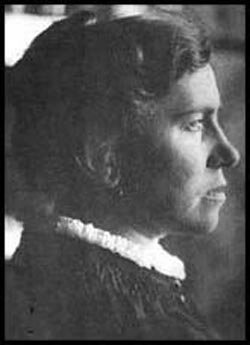Emma Goldman
by Radiyah Shakur
Goldman belonged to a unique and expressive subculture that flourished in America in the late nineteenth and early twentieth centuries. Its members were an eclectic mix of creative artists, intellectuals, and writers, most being libertarians, and some of them revolutionaries. What united them was their rejection of bourgeois culture and fervour for such causes as the labour movement, socialism, anarchism, sexual freedom, and feminism.
 Emma Goldman, Jewish Lithuanian-born anarchist, immigrated to the United States in 1885 and worked in a clothing factory in Rochester before moving to New York City in 1889. In New York she joined the German anarchist movement and met one of its leaders, Johann Most, whose libertarian writings influenced Goldman to become an anarchist. She also met Alexander Berkman, to whom she became his life-long companion. In 1892 she assisted Berkman’s attempted assignation of Henry Frick, of the Carnegie Steel Company, for his terrible treatment of workers during an industrial dispute. Emma Goldman’s defense of Berkman’s actions made her unpopular with authorities. Berkman was imprisoned for fourteen years. Emma Goldman, Jewish Lithuanian-born anarchist, immigrated to the United States in 1885 and worked in a clothing factory in Rochester before moving to New York City in 1889. In New York she joined the German anarchist movement and met one of its leaders, Johann Most, whose libertarian writings influenced Goldman to become an anarchist. She also met Alexander Berkman, to whom she became his life-long companion. In 1892 she assisted Berkman’s attempted assignation of Henry Frick, of the Carnegie Steel Company, for his terrible treatment of workers during an industrial dispute. Emma Goldman’s defense of Berkman’s actions made her unpopular with authorities. Berkman was imprisoned for fourteen years.
The following year Emma Goldman was convicted of ‘’inciting a riot’’ by telling the unemployed to steal bread if their plea to be given food went ignored. After being released from prison Goldman became involved in the campaign for women's suffrage and birth control information. In 1901 when President William McKinley was assassinated by self-proclaimed anarchist Leon Czolgosz, she found her name entangled in more controversy. Czolgosz claimed Goldman’s speeches had influenced him; and as a result Emma Goldman was arrested on charges of conspiracy to assassinate the President, but was released fourteen days later due to inadequate evidence to link her to the crime. Emma Goldman did not advocate violence; however she defended Czolgosz by stating, "As an anarchist, I am opposed to violence. But if the people want to do away with assassins, they must do away with the conditions which produce murderers."
From 1906-1917 Goldman edited and published the influential anarchist journal, Mother Earth, along with Alexander Berkman. She also wrote Anarchism and Other Essays in 1910 and The Social Significance of the Modern Drama in 1914. She opposed America's involvement in World War I, and set up No Conscription leagues and held protests condemning the War. This earned her two years in jail and deportation to Russia along with 246 other left-wing figures.
Being in Russia, Emma Goldman was able to witness the Russian Revolution first hand. As an anarchist, however, Goldman was repelled by the Bolshevik dictatorship. She later moved to Britain after marrying a Welsh miner and obtaining British citizenship. Her books, My Disillusionment in Russia and My Further Disillusionment in Russia helped to turn many socialists against the Bolshevik government. Goldman moved to France and her autobiography, Living My Life, was published in 1931.
In her sixties, Goldman visited Spain to observe the Spanish Civil War. She made three visits to Spain during the course of the war, acting as publicist and fund-raiser for Spanish anarcho-syndicalists. She opened a Nation Confederation of Trabajo (CNT) and Federación Anarquista Ibérica (FAI) propaganda office in London, and co-established the Committee to Aid Homeless Spanish Women and Children.
Emma Goldman was in Toronto when she died of a stroke on 14 May 1940. The USA government decided to give permission for her body to be buried in Chicago.
|
|




